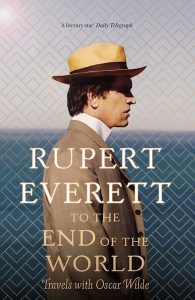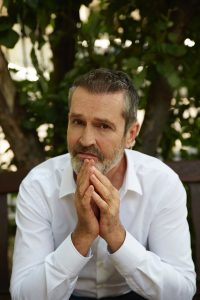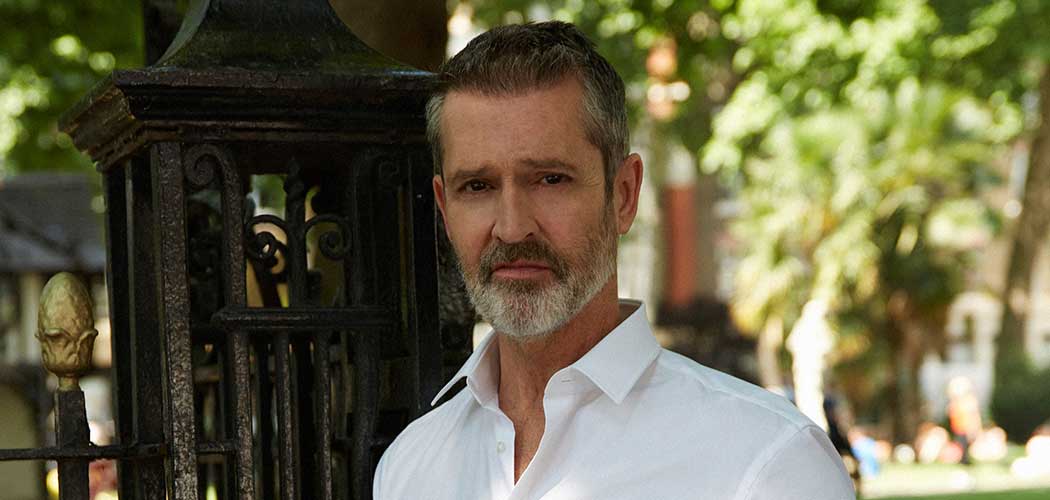Rupert Everett talks to David Hudson about his new memoir, getting older, and why it’s so much easier to be out as an actor these days.

Rupert Everett is back with a third memoir. Like his previous autobiographical works – 2006’s Red Carpets and Other Banana Skins and 2012’s Vanishing Years – it’s a gossipy, candid and insightful look at the world of fame and the movie-making business.
To The End of the World: Travels with Oscar Wilde examines the decade Everett took to make The Happy Prince, his 2018 movie about the final, post-prison years of the famed writer’s life. Everett found himself trekking the continent in a bid to raise the funds to make his movie, and the book will delight anyone who wants a peek at the reality, and dramas, of trying to bring such a labour of love to the big screen.
“Most people, I let them read what I’ve written before I publish, to see what they think and if they have any issues,” he tells me in a phone call from his home in Wiltshire when I ask him if he worries how any anecdotes will be received. This is perhaps a precaution he’s embraced in more recent years. He famously fell out with Madonna after talking about her in his first book (comparing her to a “whiny old barmaid” in one chapter). Has he ever regretted anything he’s written?
“No, not really. The thing about writing books is that you have to go over them again and again. By the time your book comes out, you’ve read it about 12 times.”
One thing made clear in the book is his obsession with Oscar Wilde. It carried him through the process of making The Happy Prince when many others may have given up. If he knew the amount of time and energy it would take to bring the movie to the screen, would he still do it over again?
“Well, you always say no at the time, but making films is a funny thing. It’s a bit like childbirth. As soon as it’s over, you have some amnesia about the pain and you’re ready to go into another thing.”

Like many others in the industry, Everett has seen his career on pause during recent months because of the pandemic. He’d just started a run of Who’s Afraid of Virginia Woolf? on Broadway when theatres fell silent in March. At the time of writing, he can currently be seen on Channel 4’s porn industry drama, Adult Material. His next work is shooting a movie “about UFOs” in Ireland in November. At least, that’s the plan, if restrictions allow.
Everett has previously suggested that coming out as gay impacted his career in Hollywood, where he enjoyed being feted for a short while following his appearance opposite Julia Roberts in 1997’s My Best Friend’s Wedding. In 2009, he gave an interview to The Guardian in which he suggested he wouldn’t necessarily recommend other actors come out. Does he stand by that opinion?
“No, I never said that,” he firmly corrects me. “I said it’s up to everybody else to make their own decisions. I wouldn’t give advice to anyone. I wouldn’t be that impertinent, actually. Everyone has the right to make their own decisions. I’ve never said what anybody should do, ever.”
There’s been a recent trend to call out gay roles being given to straight actors. Call Me By Your Name and Supernova, starring Everett’s friend Colin Firth and Stanley Tucci as longterm gay partners, spring to mind. Does Everett have thoughts on the issue?
“No, I don’t. I wouldn’t have missed Michael Douglas and Matt Damon in Behind the Candelabra for anything. But I wish it went the other way, really. I wish gay actors could play straight roles more. Now maybe they are, but I think acting is acting.”
The book’s later chapters cover Everett’s promotional tour for his movie, taking him to Europe, the US, London, and – memorably – Glasgow and St Petersburg. A visit to the Four Seasons in Milan for a film festival reminds him how the last 20 years since his “heyday” have zipped by. However, although many gay men struggle with ageing, Everett, now 61, says he doesn’t.
“I love it,” he says without hesitation. “I’m in the inbetween stage, I suppose, before things start collapsing physically, so at the moment I’m enjoying it. You have to come to terms, for example, with becoming less attractive or becoming invisible, which you do on the gay scene after the age of 45. It can be quite scary, but at the same time, it can also be quite refreshing. You have to look around for new interests.”
In the book, Everett is captivating when addressing the fickle nature of fame: how it ebbs and flows like the tides. His career has continued to keep him in the limelight – or within its vicinity – for almost 40 years. One suspects it’s unlikely to disappear anytime soon, whatever he may fear in his darker moments. That he can write so brilliantly does him no harm, either. To The End of the World is possibly his best memoir yet.
To The End of the World: Travels With Oscar Wilde is out now, published by Little Brown.














